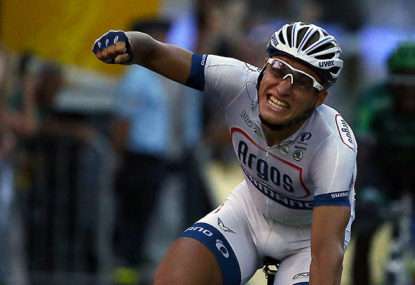'I've just won a stage of the Tour de France, mate!': Hindley grabs yellow jersey as Aussie blows Tour apart
Australia's Jai Hindley has said he is "lost for words" after a shock stage victory at the Tour de France earned him the leader's…

Memories of twilight loops around the Arc de Triomphe have barely faded and we’re ready to again, after last night’s announcement of the 2014 Tour de France route.
In pure numbers, the race looks fairly normal; 21 stages over 3656km, nine flat stages, five hill stages and six days in the mountains, five of which are summit finishes.
But there are a number of devilish twists that promise to make the 101st edition just as memorable.
Interestingly, there’s no teams time trial and there’s only one individual TT, which doesn’t happen until the second last day.
And there’s a return to the cobbles.
The sprinters will be happier than last year because the absence of TTs means there are two more stages for them to contest.
That said, the climbers will be happier too, because the there’s one more summit finish than last year.
The final stage will also conclude with loops around the Arc de Triomphe.
We already knew the first three stages would be raced in England, the fourth time the Tour has visited ‘old Blighty’.
From there le Tour heads to the coastal town of Le Touquet-Paris-Plage for a flat but windy 164km ride to Lille.
Stage Five features 15.4km of cobbles in the 156km ride from Yres to Arenberg. The riders will tackle nine sectors of cobbles, two more than when the race was last there in 2010. The cobbles have been renovated too.
As in stage four, wind could also be a factor in stage six from Arras to Reims, but it should again be a sprinters’ day.
If Mark Cavendish is in great form, he could also make it back-to-back victories into Nancy on stage seven, a day dedicated to remembering World War One.
Cav actually won when the race started in Epernay in 2010, while Peter Sagan triumphed when he left from Epernay in 2012.
Stages nine, 11, 12, 15 and 19 are also stages the sprinters will have ringed as potential glory days.
For the climbers, stage eight offers the first taste of the 25 categorised climbs with three ‘bergs inside the final 19kms.
The final ascent up Gerardmer la Mauselaine is a pinchy 1.8km at 10%.
Bastille Day, July 14th, is always a key date in le Tour as the ‘locals’ put in that little bit extra to win on their national day.
Well this Bastille Day the French won’t have it all their own way because it’s potentially a decisive day in the race.
Stage 10 from Mulhouse to La Planche de Belle Filles features seven categorised climbs in the 161km race.
In 2012, Chris Froome won here seeing off a challenge from Cadel Evans before helping Brad Wiggins into yellow. He’ll remember the final climb – 5.9km at 8.5% – fondly.
Stage 13 is the first of just two days in the Alps, but there are only two categorised climbs. The climax however is a real beast.
The ramp to the line in Chamrousse is an 18km slog averaging 7.3% including two sections over 11%. The final kilometre does ease off though to an easy 3%.
There are three categorised climbs in stage 14 that again finishes on top of a mountain. This stage features the high point of the Tour, the Col d’Izoard (2360m), as the peloton treks to Risoul (1855m) and a final climb of just 12.6km at 6.9%.
Chris Froome won here in the 2013 Dauphine, while this year’s climbing revelation, Nairo Quintana, won twice here in the 2010 Tour le’Avenir in both a time trial and normal mountain stage.
The lack of Alps will be more than compensated by three gruelling days in the Pyrenees in stages 16, 17 and 18.
Day one features the Portet-d’Aspet (5.4km at 6.9%) and the rather daunting Porte de Bales (11.7 at 7.7%), but this climb doesn’t come until the 215km mark when there are still 22km to race.
Thomas Voeckler won’t mind though, he’s won twice in Bagneres-de-Luchon, the last time in 2012.
The following day is only 125km long but features 40km of climbing, over four categorised climbs, all inside the final 100km.
The 13km (7%) col de Peyresourde arrives at 82km before the climax up to Pla D’Adet (10.2km at 8.3%).
The final day for the mountain goats again takes the peloton over 2000m as they crest the legendary Tourmalet. Again, it’s only a short stage at 145km but the finish up to Hautacam is a 17km sufferfest averaging 7.8%.
This is a summit for a miracle, given it sits above Lourdes. It’s also where Cadel claimed his first yellow jersey in 2008.
Cadel won’t be there in 2014 but these parcours have plenty to satisfy those who want to follow in his footsteps or prefer the flatter roads ala Robbie McEwen and Baden Cooke.
And after a flat stage, the riders get a chance to race the clock in the Tour’s only time trial.
Stage 20 has been designed to pay homage to five-time winner Miguel Indurain, who won in Periguex in 1994. The course is in the opposite direction to that day almost 20 years, but is still one with a lot of false flats over its 54km.
So not a Tour that promises the brutality of last year, but it does feature a day on the cobbles, and personally, I love the uncertainty that brings.
How many sleeps to go?